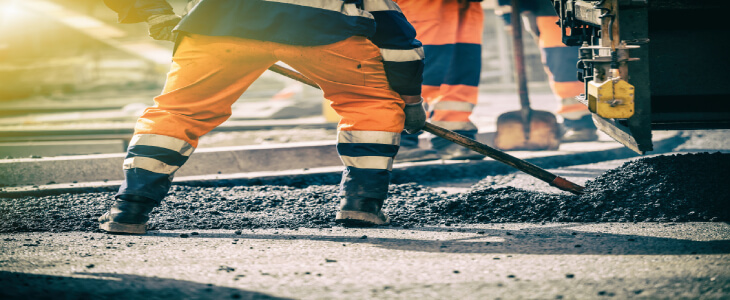The Federal Employers Liability Act (FELA) is a federal law designed to protect railroad workers injured on the job. Although the benefits under FELA are greater than those in a typical worker’s compensation claim, recovering damages can be complicated. The best way to protect your rights is to consult an experienced railroad worker injury FELA claims attorney.
Cooper Schall and Levy regularly represent injured railroad workers in Philadelphia and throughout Pennsylvania and New Jersey. Well-versed in the provisions of FELA, we have a well-earned reputation as dedicated advocates of injured railroad workers. When you become our client, our personal injury lawyers will work tirelessly to help you obtain just compensation.
What are my rights under FELA?
FELA requires all railways to provide their employees with a safe working environment. If a worker is injured because the railway failed to take necessary safety measures, or because of another employee’s carelessness, the railway can be held liable. Under FELA, injured workers have a right to file a lawsuit in state or federal court to recover damages.
Despite these legal protections, employers have an unfair advantage over those who suffered a railroad worker injury. Armed with teams of powerful attorneys, railways often attempt to deny injury claims or pay as little as possible. At Cooper Schall and Levy, our railroad worker injury attorneys know how to level the playing field. You can rest assured we will fight for the maximum compensation you deserve.
Recoverable Damages For Railroad Worker Injury Victims
Unlike a Pennsylvania workers’ compensation claim, FELA allows injured workers to recover damages for:
- Lost wages
- Loss of earning capacity
- Medical expenses (past and future)
- Pain and suffering
- Permanent disability
- Disfigurement
- Emotional distress
- Loss of enjoyment of life
To have a valid claim, an injured railway worker must be able to prove that (1) the employer was negligent and (2) the employer’s negligence directly contributed to the accident that caused his or her injuries. Examples of railway negligence include:
- Failing to establish and maintain appropriate workplace safety rules
- Failing to provide proper tools, equipment, and protective wear
- Failing to adequately train employees
- Failing to provide sufficient manpower
It is worth noting that FELA claims are similar to personal injury lawsuits in that comparative negligence applies for purposes of determining liability. This means that the railroad can still be held liable even if you were partially responsible for causing your injury, however, the damages awarded will be adjusted by the percentage of fault assigned to you. As an example, if your damages are assessed at $100,000 and you are found 20 percent at fault, your award will be reduced to $80,000.
Types of Injuries Covered under FELA
FELA covers a wide range of injuries, including:
- Broken bones
- Back injuries (e.g. herniated discs)
- Head and neck injuries
- Hearing loss
- Occupational illnesses (e.g. asbestosis, mesothelioma, lung cancer)
- Repetitive motion injuries (e.g. tendonitis, carpal tunnel syndrome)
- Aggravation of pre-existing conditions
Although railway work is inherently dangerous, workers should not be subjected to occupational hazards arising from another party’s negligence. At Cooper Schall and Levy, we are dedicated to holding employers accountable and protecting the rights of injured railway workers.
What should I do if I have been injured?
After a railway injury, it is important to take the following steps:
Seek medical attention from your doctor, even if you are initially uncertain of the extent of your injuries. Failing to do so can cause your injuries to worsen and also have an adverse impact on your FELA claim. The medical record will serve as important evidence that supports your claim. You should know that you are not required to see the railway’s doctor.
Immediately report the injury to a supervisor, foreman, trainmaster or dispatcher, and complete a personal injury report or accident report.
Get the names and contact information of any witnesses and take photos of the accident scene if you are able to do so.
Contact an experienced FELA claims attorney before you make any written or recorded statements.
Ultimately, choosing the right lawyer can mean the difference between having your claim denied and obtaining the benefits you deserve. At Cooper Schall and Levy, we have a working knowledge of FELA and a proven history of achieving substantial legal settlements and jury awards.
How long do I have to file railroad worker injury claim?
Generally, you have three years from the date of your injury to file a lawsuit or to pursue a settlement with the railway, with the exception of certain occupational illnesses. If your claim involves hearing loss or exposure to hazardous chemicals, you have three years from the date when you know, or should have known, that you suffered a work-related injury. The sooner you contact our office, the sooner we can begin working on your FELA case.
Contact Our Philadelphia Railroad Worker Injury FELA Claims Attorney
If you are an injured railway worker, you likely have concerns about obtaining the medical care you need, recovering from your injuries, and not being able to earn a living. At Cooper Schall and Levy, we will address those concerns by providing you with powerful representation and reliable, responsive service.
By conducting an extensive investigation, we will determine the cause of the railway accident that led to your injuries and work to hold the responsible party accountable. Above all, we will fight to help you obtain compensation that considers all of your medical and financial needs. We handle all FELA claims on a contingency basis, which means that you will not pay anything to us until we win damages for you. Please contact our office for a free case evaluation.
Cooper Schall & Levy personal injury lawyers serve Philadelphia, Pennsylvania as well as neighboring counties such as Montgomery County and Delaware County and cover neighborhoods such as Norristown and Drexel Hill.


